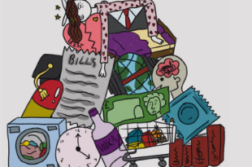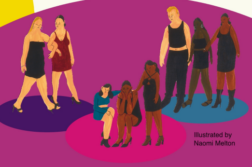Looking back and reminiscing on my time at school, there is a big black hole in my education that still exists years later: sex education. Growing up, I remember the sex education classes that were taught in schools but I do not remember learning anything new or even useful. Either I had learnt it by myself (e.g. how to deal with periods), or discovered it on the internet, because that now existed. It’s hard to then say what my personal sex education experience has given me, and I would honestly say it was nothing.
There is a severe lack in the content taught in schools when it comes to relationships, sex, and bodies. Many are left with a complete blank, misinformation being shared between peers or a complete naïvety towards sexual health. It isn’t just the importance of learning good sexual health that’s lacking, but schools should also be teaching more about relationships and sexuality so that kids growing up don’t feel shame or embarrassment when their feelings don’t conform to the “norm”, and so those in relationships have some understanding about how to navigate their way through them when it comes to consent, pressure, or abuse.
Whilst these may seem like heavy and inappropriate topics, there are ways to educate those in schools about them in such a way that is informative while remaining appropriate. In doing so, people are hopefully set up for experiences they might encounter as they continue to grow up and will have the tools for and education on how to deal with certain situations. However, though many schools educate their students on physical health, this is mostly focused around diet and exercise, with sexual health being completely absent.
Although there is a brief mention about the fact that STIs do exist, the rhetoric that surrounds them is dominated by feelings of shame, disgust and embarrassment. All this does is harm those that end up contracting one. In reality “nearly half of all new sexually transmitted infections are in people under 25” with “a new STI diagnosis [happening]in England every 70 seconds.” These figures aren’t dirty or embarrassing and sexual diseases or infections should be thought of just like any other physical ailment; they’re just another thing to get treated.
There are numerous factors that have led to people not going for check ups or not having an education about STIs and sex. One of the major reasons is the cut in spending for sexual health in England, which is reportedly down by 25% since 2014. It is evident that sexual health hasn’t been a priority for governments and action needs to be taken. That is why The Terrence Higgins Trust and British Association for Sexual Health and HIV have teamed up to tackle the issue, publishing a report that includes recommendations such as “providing local government with more funding to improve sexual health services and doing more to encourage people to get help.”
In a response, a Department of Health and Social Care spokesperson stated that “more people than ever are now able to access sexual health services”, but when there is an existing gap in knowledge it means that people don’t know which sites to trust or where to go in order to get help. Couple this with the intense stigma surrounding simply visiting a sexual health clinic and you’re left with more people not being regularly checked, STIs going untreated, and the stigma being propagated.
What needs to change is the attitude towards STIs from the moment we start talking about sex or being educated on it. Instead of treating them as something dirty and bad, people should be made aware that it could happen, just in the same way you could catch a cold, and taught how to prevent them. In opening up that dialogue, we can work to ensure that the stigma and feelings of embarrassment can be reduced and hopefully lead to more people seeking help when needed or taking control of their sex lives and protecting against them.
However, there is also the issue of funding and the reduction of sexual health clinics. To this, the same approach needs to be adopted and the conversation opened with the right information being spread. In the age we live in, where the internet is accessible to many and used by them, there are easier ways to educate yourself on the facts about sex and about how to practice safe sex, so there really isn’t an excuse. Pair that with the sharing of information and the open conversations about sex that people should be having, and hopefully this will become less of a taboo and instead a topic as easy to talk about as the weather.
There is no doubt that the state of sex education and sexual health has to change so that we no longer have to talk about it in hushed tones. The surrounding rhetoric must be one of positivity, but that change is never going to happen overnight. Gradually open up conversations and start educating yourself so that the spread of misinformation isn’t what drives people’s knowledge, and people can have happier and healthier sex lives.



